Overview of the paper
Background of the topic
- Significance of alternate assessment methods;
- Application of alternate assessment methods for students with disabilities;
- Problems with suitable formative and summative assessments for students requiring special attention;
- Particularly important for K-12 study goals.
Alternate assessment methods are actively proposed for evaluating the progress of different student populations, including students with disabilities. The reason is that traditional methods of assessment are not effective enough to illustrate actual results and performance (Lazarus & Rieke, 2013). The problem is that many school districts experience difficulties with proposing adequate formative and summative assessments for those students who require special attention.
Topic relevance to K-12 assessment
- Proper assessment necessary for the achievement of K-12 study goals;
- Need for adaptation of assessment tools to show students’ progress.
Demographics of Marion County School district
- 11 public schools;
- 5,029 students;
- High diversity in School district;
- Student-teacher ratio: 16:1 (“Marion county public schools,” 2017).
To guarantee the achievement of K-12 study goals, teachers should not only pay attention to planning lessons and proposing modifications to address adverse students’ needs, but they also should adapt assessment tools in order to see a real picture regarding students’ progress (Lazarus & Rieke, 2013).
11 public schools of Marion County School District in South Carolina serve more than five thousand students. The school district is characterized by high diversity of student population while the majority is black (“Marion county public schools,” 2017).
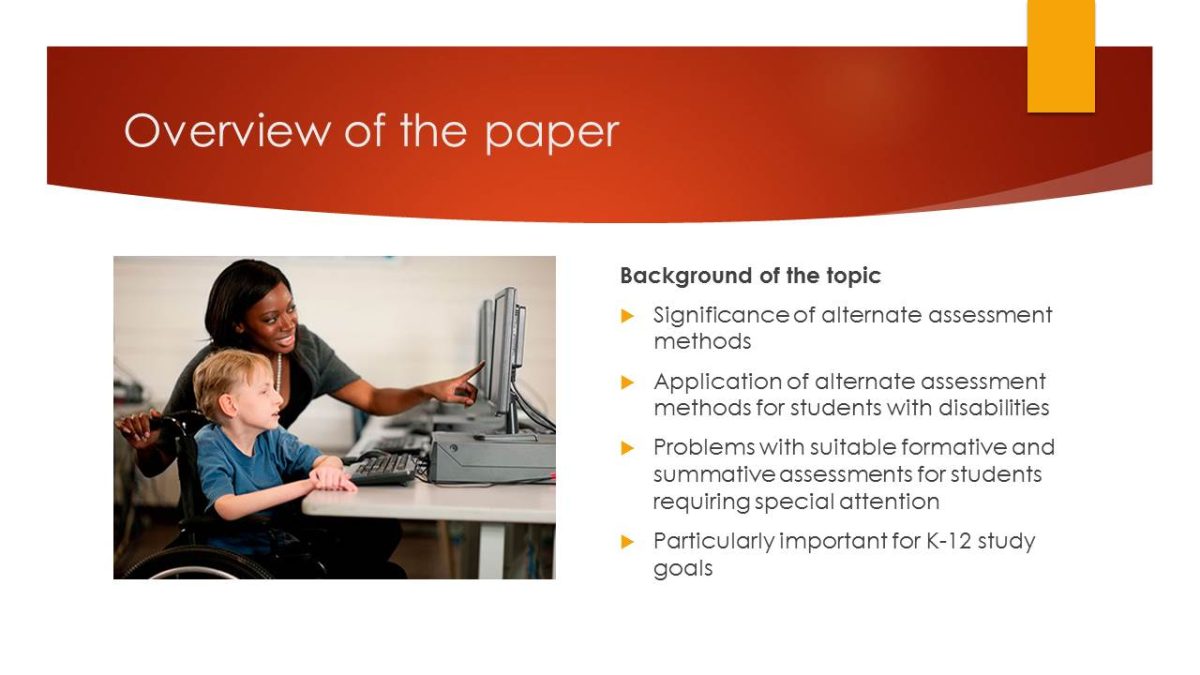
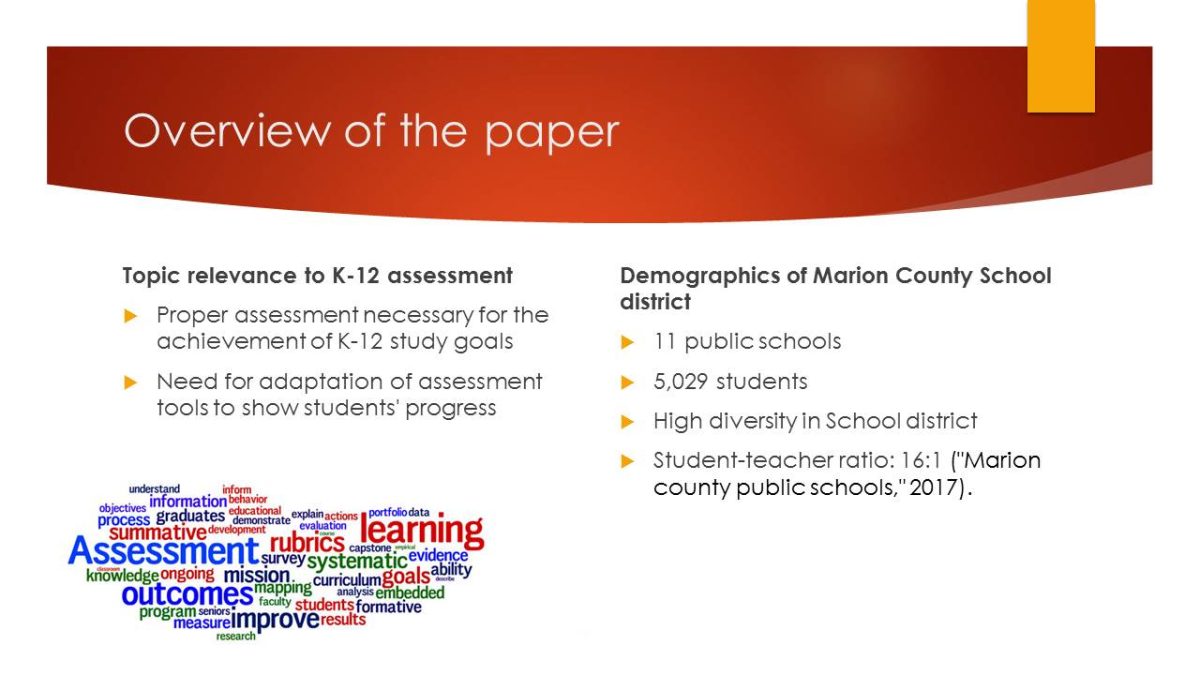
Recommendations regarding changes to the district’s current assessment goals
- In assessing reading skills, pay attention not only to understanding but to logical thinking ability;
- Application of different types of assessment;
- Provision of alternate assessment tools for students with disabilities;
- Longitudinal research to support the idea that alternate assessment tools are effective for the evaluation of academic performance of students with particular needs.
Currently, the strategic plan of Marion County School District for 2017-2018 is oriented to improving reading and writing skills of diverse students, including students with specific learning disabilities, such as dyslexia, nonverbal learning disabilities, and dysgraphia among others. Still, some changes such as the introduction of alternative assessment tools are necessary for the better efficiency of this strategic plan.
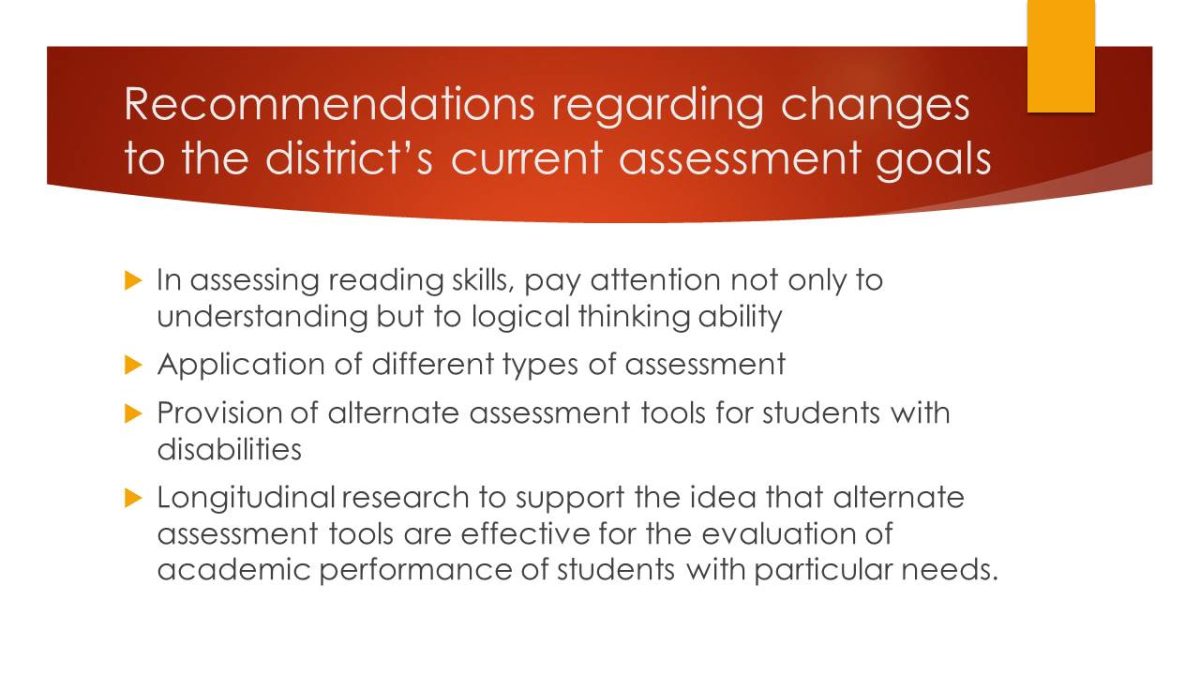
Major issues
Political
Adoption of the 2002 No Child Left Behind Act, that obliged schools to report on students’ academic achievements, including students with disabilities and special needs. It resulted in problems while choosing the most appropriate alternate assessments for their students with special needs.
Legal
Development of individual education plans under the Individuals with Disabilities Education Act (IDEA). Students with learning disabilities have rights to be educated regarding an individual plan that includes alternate assessments (Cho & Kingston, 2013).
Current problems
Teachers frequently experience problems with alternate assessment tools while adapting them to individual education plans and students’ specific needs. Some of the barriers preventing a successful adoption of alternate assessment include a lack of resources, the need for trained educators, and potential resistance to new assessment tools both among teachers and students.
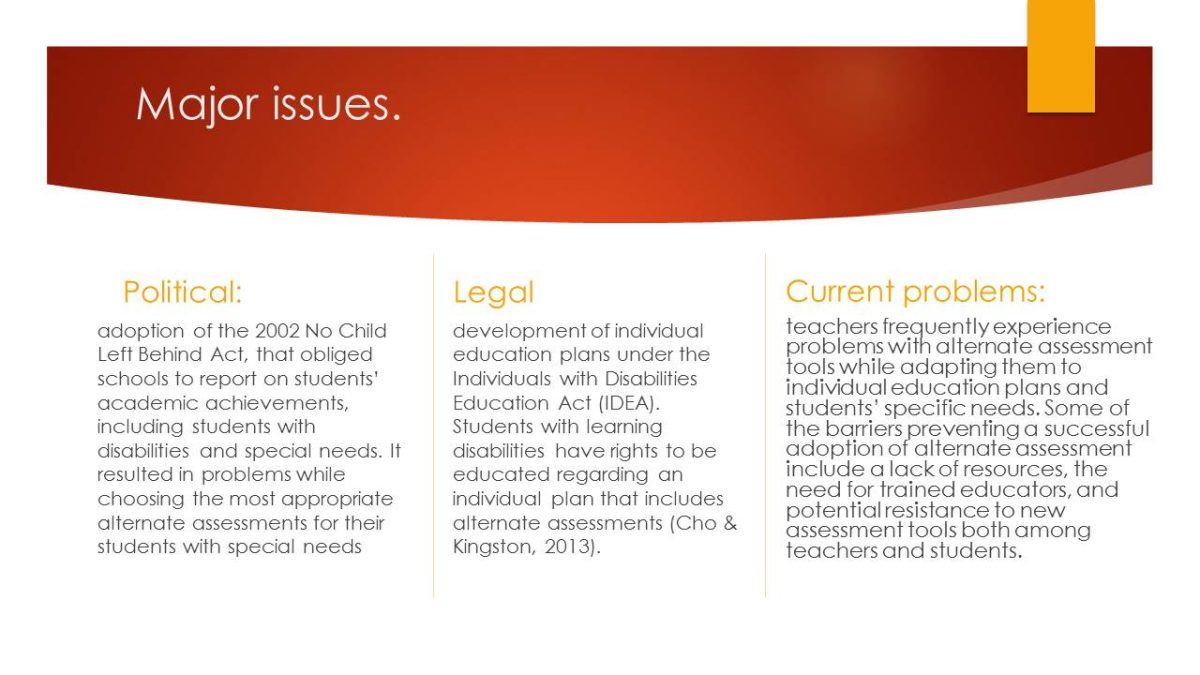
Methods to develop a district-wide professional development plan
One of the methods to use this work for the creation of a district-wide professional development plan is to use it as a basis for further discussions. Excessive debate on some significant problems can give good results.
Another way to use the paper for developing a plan is to make it a source of information. Since it is a research concerning the issue of alternate assessment tools, it can provide guidance for the professional development plan.
Finally, the paper can be used as a report about the condition of development of alternate assessments. It states major problems that contemporary schools have with an assessment of children with special needs.
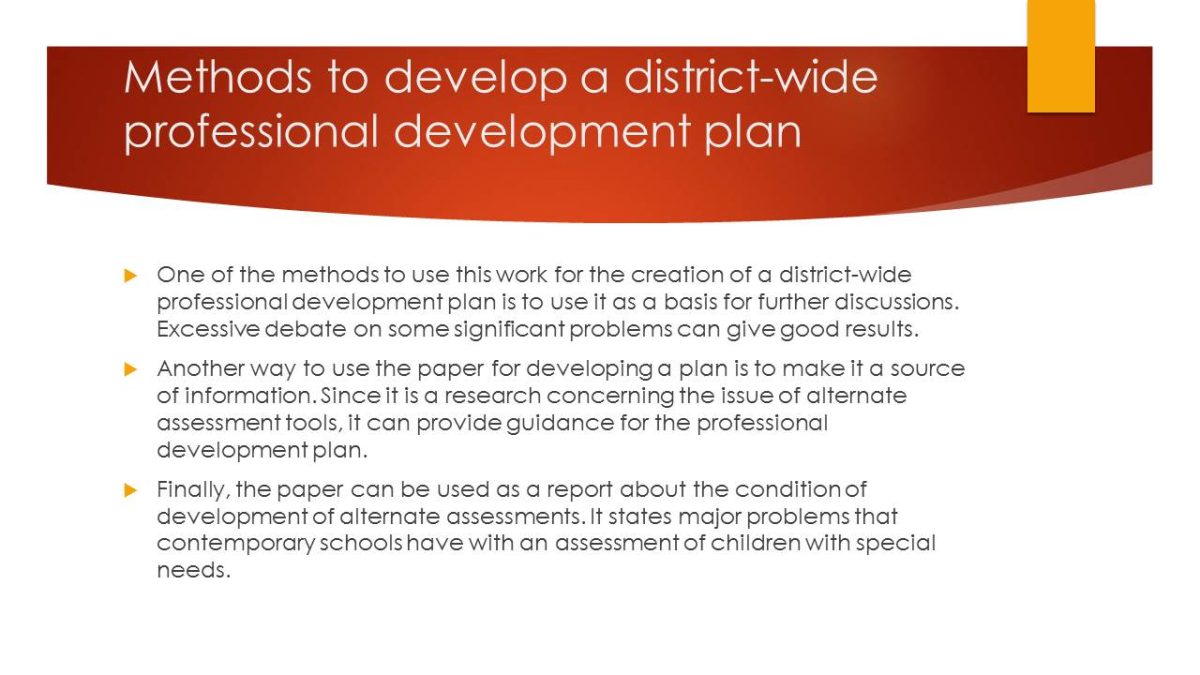
Strategies to apply the technology of assessment
- Change major stages of lesson planning;
- Improve teacher’s skills and knowledge;
- Introduction of self-regulation strategies.
Change major stages of lesson planning
To achieve the goals of K-12 with students with particular needs, lesson plans have to be altered. This method would allow addressing the student’s needs. Thus, the peculiarities of changing lesson plans can be transferred to a professional development plan and thus adapt its goals to specific needs of students.
It is important to create a professional development plan for the educators of the district that would be able to improve the overall test scores of the district. Some methods or strategies can be implemented to utilize the technology of alternative assessment. First of all, it is important to make changes in lesson plans and after the changes prove their efficiency, a district-wide professional development plan can be developed using the experience of lesson plans.
Improve teacher’s skills and knowledge
The improved of skills and knowledge of teachers can also contribute to a positive effect of using alternate assessments. Skilled and well-trained teachers with enough experience can provide valuable evidence-based experience to make their work more efficient. Moreover, teachers can be involved in evaluation or testing of the developed strategies as practicing experts.
Introduction of self-regulation strategies
Self-regulation strategies that are frequently used to allow students to understand what they do, individually plan learning process, evaluate their successes and assess achievements, can be also applied in every-day work of a teacher. Such strategies as self-monitoring, self-evaluation, self-instruction, goal setting, and others can be helpful in planning and assessing educational interventions within the mentioned plan (Reid, Lienemann, & Hagaman, 2013).
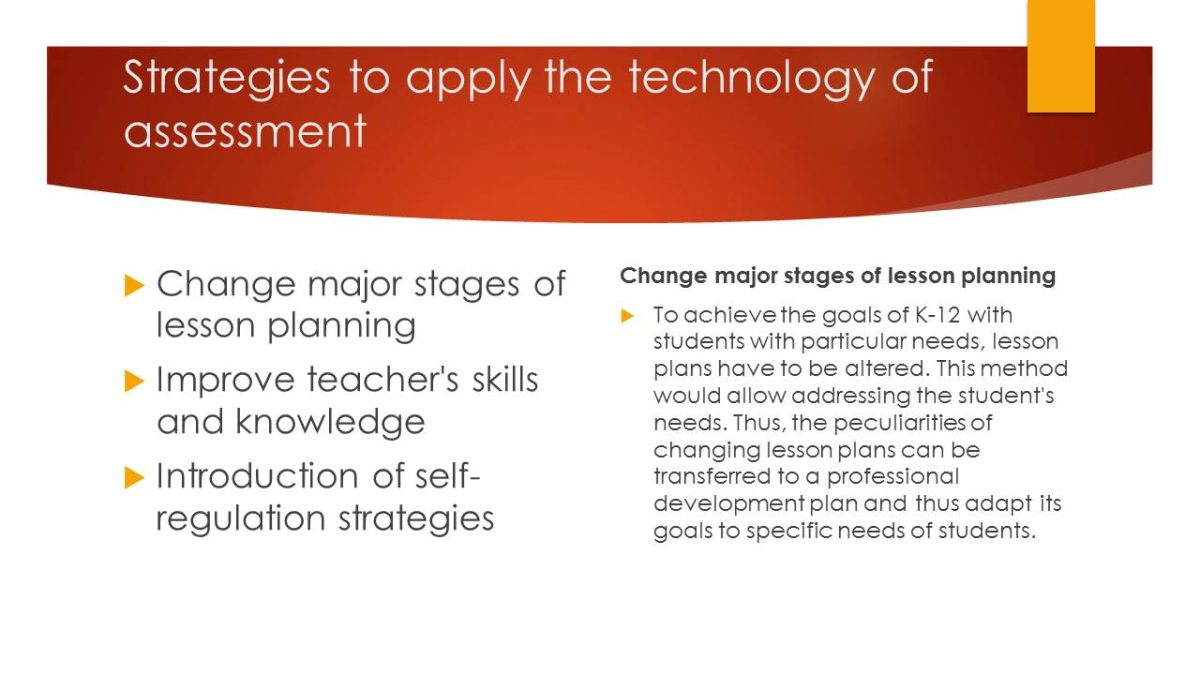
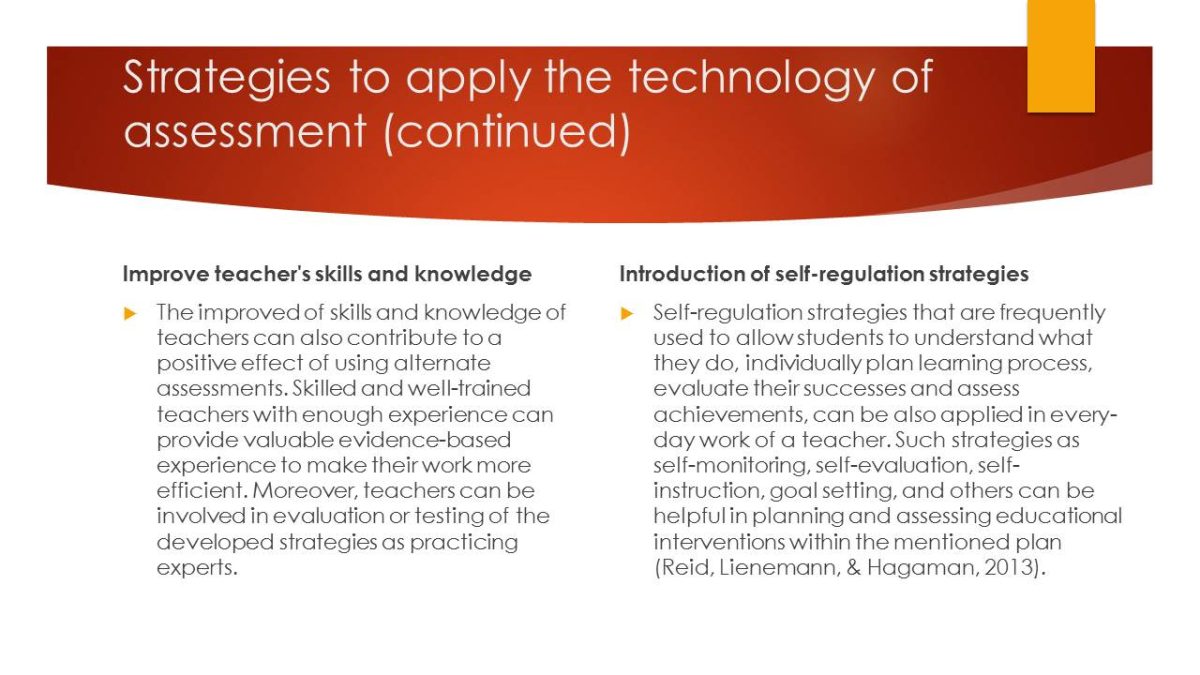
Personal reflection on knowledge obtained during the course
- New approaches to educational assessment;
- Application of new advances in the sphere of educational assessment;
- Traditional assessment theories;
- Application of technology and information resources to study educational assessment;
- Importance of alternate assessment approaches for students with special needs.
The course allowed me to realize the significance of assessment in education in general and the necessity of alternative evaluation methods and tools for students with special needs. I have learned the connections between the traditional theories of assessment and modern advancements in this field. The major problem of assessment is that in many school districts throughout the country there are students with disabilities who require special attention both in learning and assessment. Nevertheless, schools frequently experience difficulties with proposing adequate formative and summative assessments for those students.
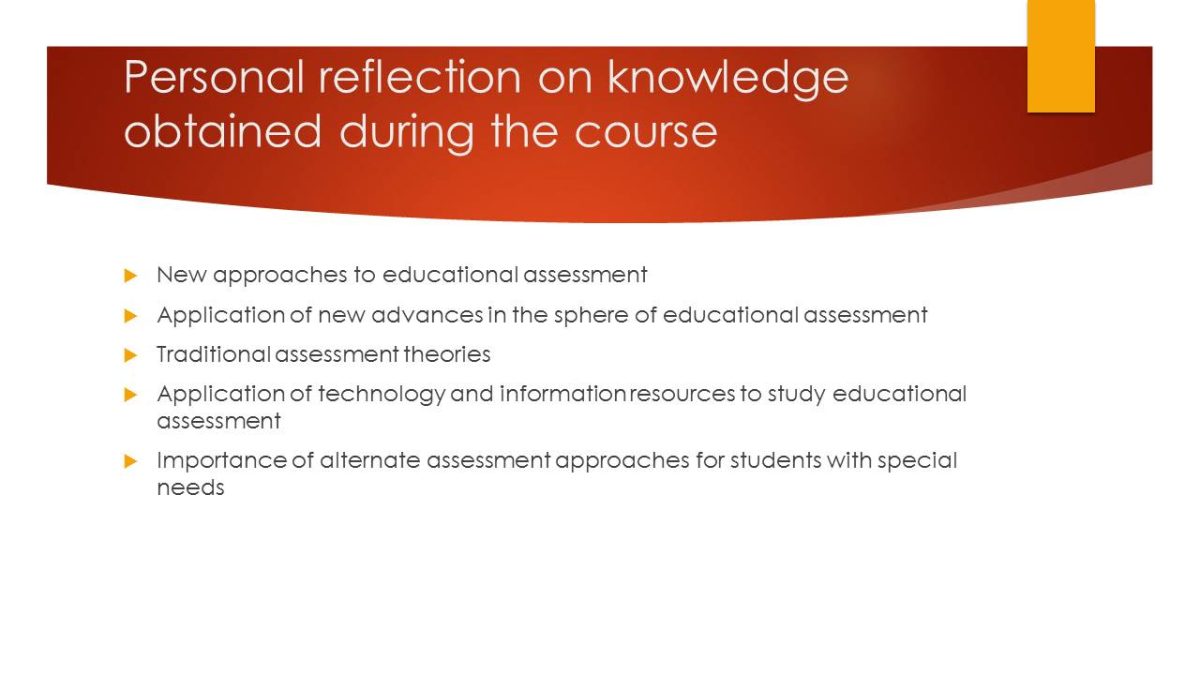
Personal reflection on the new technologies previously researched
- Diverse advances in computer and web technologies;
- Developed opportunities for more effective assessment;
- Software to conduct formative assessments of students;
- Simulation-based activities and assessments;
- Computer-adaptive testing.
After reviewing new computer and web technologies that empower assessment process, I came to a conclusion that evaluation of students’ can become faster and more unbiased. For example, the technology developed by the Center on Technology and Disability (CTD) is the software used by teachers to conduct formative assessments of students with disabilities that allow teachers to record their responses and behaviors directly on the handheld. Another assessment tool that can be effective is computer-adaptive testing also known as CAT in which a student answers sets of questions of diverse difficulty and a more complicated level can be obtained after the previous one is answered correctly.
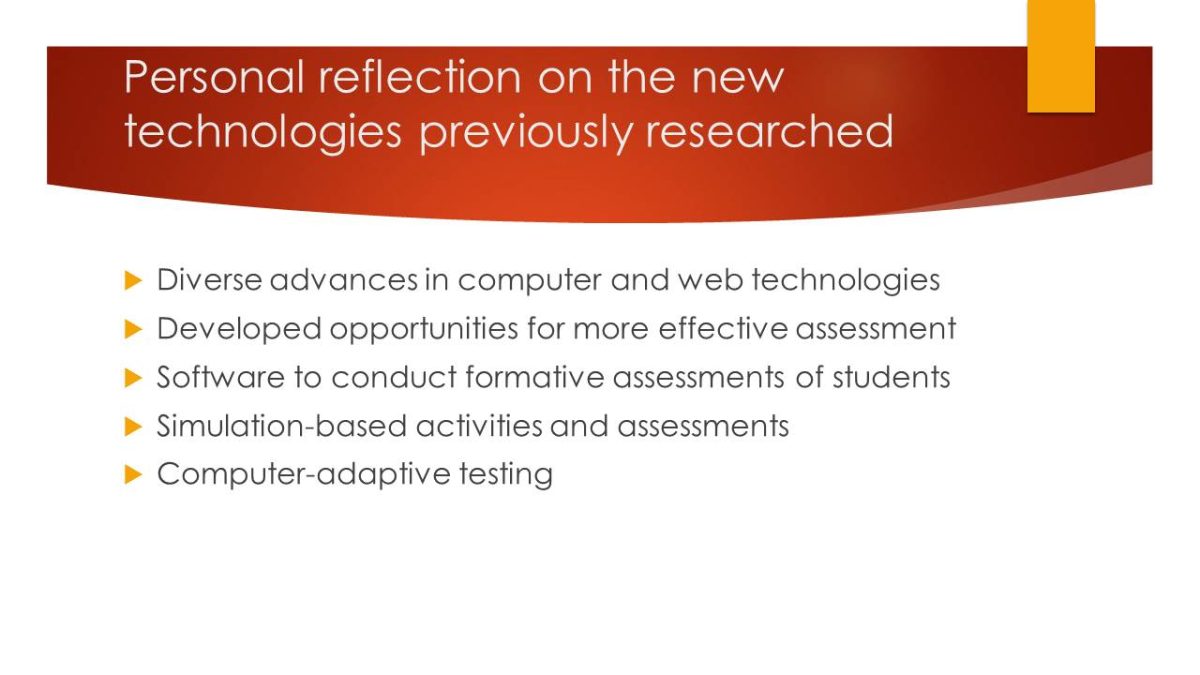
Personal reflection on the manner of implementation of recommendations for the school district or classroom practices
- Necessity to consider student’s personality and peculiarities;
- Not to be obsessed with perfect results;
- Pay more attention to progress than to meeting average standards;
- Support of students’ achievements;
- Allowing self-assessment techniques;
- Moderate and adequate use of technology.
As a professional, I believe it is significant to take into account peculiar features of every student when assessing their success. Moreover, there is no necessity to be over-concentrated about the results because in the case of disabled children, it is more important to measure their progress than the result compared to average. Thus, any results should be carefully studied. Also, self-assessment techniques can be introduced to allow children evaluate themselves and be aware of the progress they make.
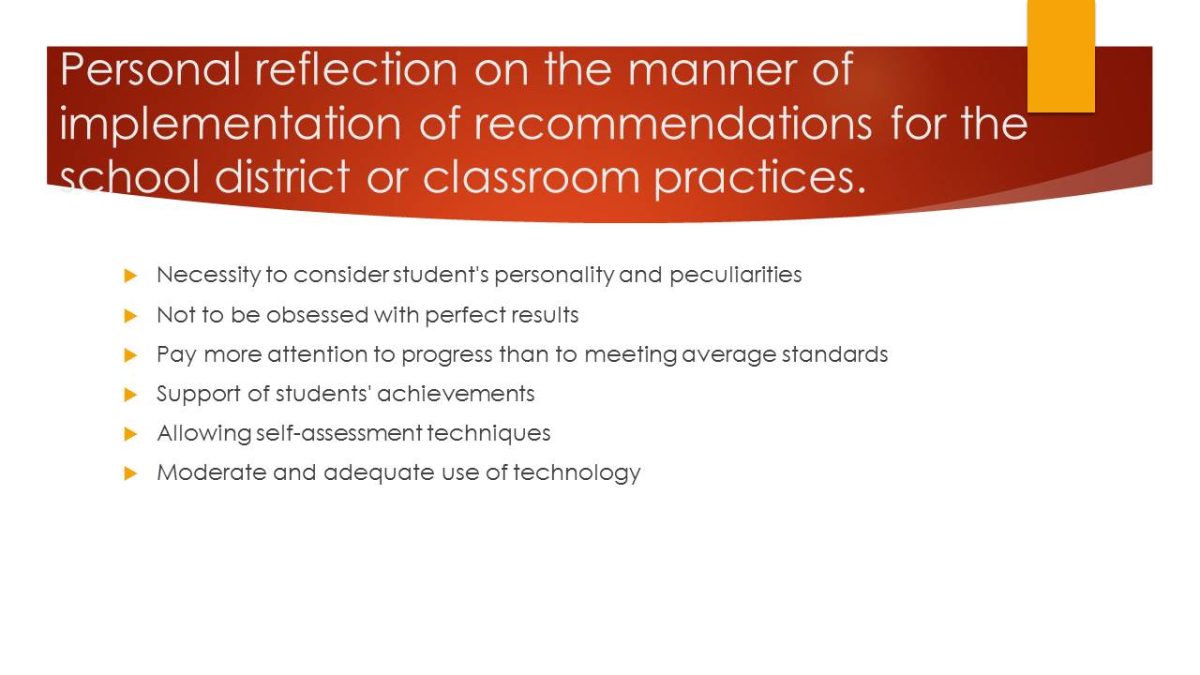
References
Cho, H. J., & Kingston, N. (2013). Why IEP teams assign low performers with mild disabilities to the alternate assessment based on alternate achievement standards. The Journal of Special Education, 47(3), 162-174.
Lazarus, S. S., & Rieke, R. (2013). Leading the transition from the alternate assessment based on modified achievement standards to the general assessment. Journal of Special Education Leadership, 26(1), 25-30.
Marion county public schools. (2017). Web.
Reid, R., Lienemann, T.O., & Hagaman, J.L. (2013). Strategy instruction for students with learning disabilities (2nd ed.). New York, NY: The Guilford Press.